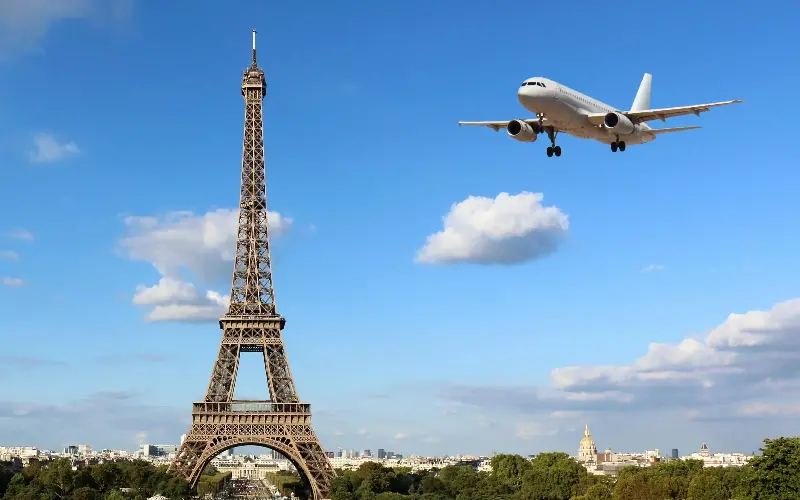
France has declared war on antisocial air passengers, introducing fines of up to €20,000 (£17,600) and four-year flight bans on unruly passengers.
The new law, effective immediately, allows the French Minister of Civil Aviation to issue fines of up to €10,000 (£8,810) for rule-breakers, rising to €20,000 (£17,600) for repeat offenders.
The fines will be imposed on those who use electronic devices when it has been prohibited by flight crew; to anyone who obstructs the performance of the flight safety; and to those who refuse to comply with safety instructions.
In some instances, rule-breaking passengers could be banned from boarding planes for up to four years.
Under existing laws, for even more serious incidents, such as when a drunk passenger causes a flight to divert, offenders could be fined as much as €75,000 (£66,200) and face a five-year prison sentence.
A growing threat to flight safety
Unruly passenger behaviour is reaching a crisis point. In 2024, there were 53,538 incident reports issued by 60 operators, according to the International Air Transport Association (IATA). This means there was one unruly passenger incident for every 395 flights.
In Europe, the European Union Aviation Safety Agency (EASA) logs between 200 and 500 incidents per month.
In a statement, Philippe Tabarot, French minister of transport, said: “Disruptive behaviour on board aircraft is unacceptable. It jeopardises flight safety and compromises the working conditions of flight crews.
“With this decree, we are equipping ourselves with the means for swift, fair, and proportionate enforcement. This new regulatory framework sends a strong message: disruptive behaviour will no longer be tolerated and will be subject to effective administrative sanctions.”
Ryanair has spoken out against unruly passengers. In June 2025, the airline announced new £500 fines on disruptive passengers, as part of a “major conduct clampdown”.
A Ryanair spokesman said: “While these are isolated events which happen across all airlines, disruptive behaviour in such a confined shared space is unacceptable, and we hope that our proactive approach will act as a deterrent to eliminate this unacceptable behaviour onboard our aircraft.”
British air rage incidents are on the rise
While France doesn’t get all of its aviation decisions right, the wider international community would do well to cut and paste its no-nonsense approach to unruly air passengers.
Some elements of this policy are strict: it would be quite something to be stamped with a €10,000 fine for tapping away a final email on your laptop when you had already been told to fold it away.
However, disruptive passengers threatening the safety of other passengers is a troubling epidemic, and France’s zero-tolerance approach will surely bring about meaningful behavioural change, if imposed properly.
We see this on routes to and from the UK. The number of disruptive passengers on UK “party flights” to destinations like Tenerife, Mallorca and Mykonos has steadily risen in recent years. Between 2019 and 2022 the number of “air rage” incidents on UK flights nearly tripled.
In a Telegraph article published in July, flight attendant Kristina Galvydyte recalled one flight where there were three stag groups on board, with just four flight attendants to bring them under control.
“We were absolutely outnumbered,” she said, recalling one group who drained bottles of duty-free alcohol faster than they could be confiscated. Soon after, they sparked a confrontation with a second group.
Countries should follow France’s lead
UK airlines are aware of the problem. The industry came together to take action back in 2018 with the “One Too Many” campaign – a cross-industry project led by the UK Travel Retail Forum (UKTRF), AirportsUK, Airlines UK and IATA, which highlights the risks of disruptive behaviour on aircraft.
Under the UK’s Civil Aviation Act 1982, disruptive behaviour on a plane may result in imprisonment or a fine of up to £5,000. If the plane is forced to divert, the fine can be as high as £80,000 with potential prison time or lifetime bans for serious offenders.
However, fines are often much lower in practice. In a recent case, a passenger on a BA flight from LA to Heathrow threatened to strangle a crew member after being handcuffed for disruptive behaviour. He was sentenced to a community order for 12 months, 150 hours of unpaid work and 20 rehabilitation requirement days. He was ordered to pay a total of just £664.
IATA argues that gaps in the Tokyo Convention 1963, which governs offences on aircraft, “means that unruly passengers escape punishment for their misconduct”. Part of the problem is that the country where the plane is registered has jurisdictions over any offences committed on board.
“This causes problems at overseas airports, where local police may not have jurisdiction to deal with incidents that occur onboard foreign registered aircraft,” the aviation body argues. As a result, unruly passengers are often released without charge and for every 10 incidents involving unruly passengers, six will walk away without prosecution.
Meaningful change will only happen when high penalties are introduced, publicised properly and imposed consistently. IATA says some countries are leading the way with their civil penalty systems, such as Australia, Finland, New Zealand, Singapore, and as we have seen this week, France. For all of our comfort, and safety, at 35,000 feet, the rest of the world would do well to follow suit.
